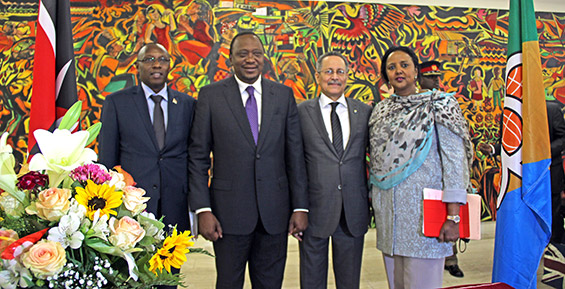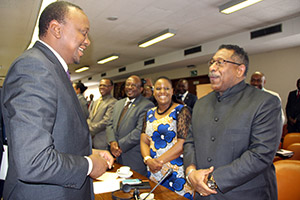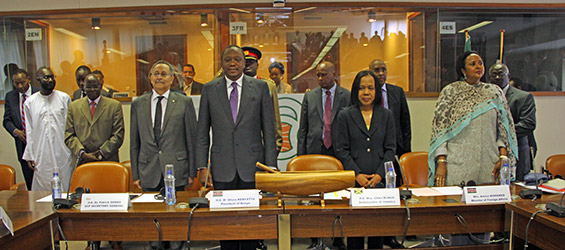Kenya President calls for re-balanced relationship with Europe

Brussels, 17 June 2016/ ACP: The President of the Republic of Kenya H.E. Uhuru Kenyatta met with Ambassadors of African, Caribbean and Pacific countries in Brussels on Friday, urging ACP member countries to work together towards transforming their economies and moving beyond aid dependency.
President Kenyatta said that the relationship between the European Union and the ACP Group, where the EU has been the main development and trade partner of the ACP for more than four decades, must change.
“We firmly believe that the new ACP-EU partnership should be markedly different from the existing framework. It should be based on partnership rather than patronage, and interdependence rather than dependence,” he told envoys during a special meeting of the ACP Committee of Ambassadors on Friday,17 June. (Read full statement)
“It should lead to the rapid transition of ACP countries from mere suppliers of raw materials and commodities, to producers of value-added goods. In this regard, the existing pattern of supply and production should be broken and we should carve for ourselves a place in the global value chains.”
Exports from ACP countries to the EU consist mainly of fuels, minerals, and agricultural products such as oil, sugar, coffee, bananas, fish, copper, and diamonds – mainly coming from the African regions. Imports into ACP countries consist largely of machinery and mechanical appliances, vehicles, equipment and pharmaceutical products.

Noting the gradual decline of ACP exports, made up of a narrow range of primary products, to the EU over the years, President Kenyatta called for increased capacity-building assistance, adding that Aid for Trade (AfT) would go a long way to address supply-side and trade-related infrastructure obstacles.
“Our respective countries have long been a source of unprocessed raw materials produced for the global market. We can only blame the ever daunting supply side constraints existing in our countries and the increasingly stringent conformative requirements that keep on piling. Preference erosion is also a major factor, and the dismal performance of our products in the EU market,” he stated.
President Kenyatta said the regional Economic Partnership Agreements between the EU and the ACP countries should be implemented and continually reviewed, in a way that promotes the productive capacity countries, as well as regional integration. After nearly a decade of negotiations, the East African Community recently concluded EPA talks with the EU, and have set a date for signing.
“As we enter a new phase of our engagement with the EU, I speak of the need for values and value addition to our raw materials before export to international markets. This will ensure that we develop our infant industries, flourish our national economies, but most importantly, provide jobs for our young people,” he continued.
Referring to ACP-EU development cooperation, which includes €31.5 billion allocated for Africa, Caribbean and Pacific countries from 2014 to 2020, President Kenyatta pointed to the conditionalities and bureaucratic requirements associated with EU aid, which results in low usage of these development funds.
He called for more emphasis on public-private partnerships and strongly endorsed the role of the private sector in development. He welcomed the ACP-wide Private Sector Development Strategy.
President Kenyatta conveyed his support for moves by the ACP Group to reposition itself to be more effective in the global arena, underlining poverty eradication as a focus and the importance of implementing the globally endorsed 2030 Agenda for Sustainable Development:
“In this day of increased globalisation, the importance of this partnership cannot be underrated given the shared principles, traditions and the common aspirations of our people… The ACP post-2020 debate requires strategic thinking on the way forward.”
The ACP Group held its 8th Summit of Heads of State and Government in Port Moresby, Papua New Guinea on 31st May – 1st June, where leaders reaffirmed their intentions to transform the Group into a more influential global actor in terms of economic and political governance.
The Summit accepted a report by former President of Nigeria Chief Olusegun Obasanjo, which included recommendations on the future orientations of the ACP Group. The Summit directed the ACP Council of Ministers to put in place a plan to implement these recommendations by the end of 2016.
– ACP Press

(Photos from top: President Uhuru Kenyatta and the ACP Secretary General Dr. Patrick Gomes, flanked by the Ambassador of Kenya in Brussels Johnson Weru and Kenya's Cabinet Secretary for Foreign Affairs and Trade Amina Mohammed; President Kenyatta greets the Dean of the ACP Committee of Ambassadors, Ambassador Roy Mickey Joy of Vanuatu; President Kenyatta at the ACP House for a special session of the Committee of Ambassadors, chaired by the Ambassador of Jamaica Vilma McNish (front, second from right))
